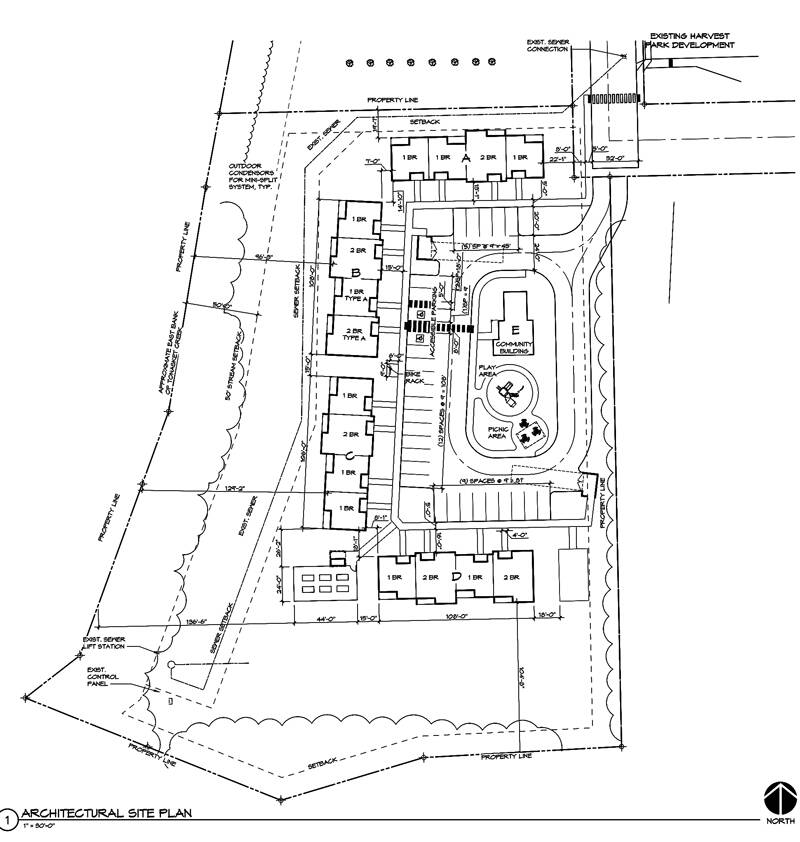OROVILLE — Construction of the Oroville Housing Authority’s proposed 16-unit housing project, the Orchard Apartments, will begin as soon as Oct. 10.
The project will be funded through a $5.5 million grant from the Washington State Department of Commerce. The Oroville Housing Authority (OHA) has partnered with the Office of Rural and Farmworker Housing (ORFH) on the project, according to Ashley Range, OHA’s executive director.
She said that 12 of the 16 units will be one-bedroom units and four will be two bedroom.
“The grant will pay for construction, as well as leave some money to hire an additional employee,” said Range. “The grant will pay for the construction of multi-family, affordable long -term housing.”
The new project will be built off Sawtell Road where the OHA’s Harvest Shelter had several aging trailers that were rented for many years to fruit growers to house farmworkers primarily during apple and cherry harvest. They also served as the Winter Emergency Camp in the off-season to shelter the homeless. These trailers were made available for purchase and local orchardists were encouraged to buy them for their worker housing. Several have been purchased and some have been moved out already, according to Range, who expects the remaining sleeping trailers will soon be gone, as well as the common area trailers that held the kitchen, showers, restrooms and laundry.
“We wanted to offer them to our local growers first as our way of giving back to the community,” said Range.
While the trailers at the Harvest Shelter were rented to orchardists to house their workers, as well as a homeless shelter, the new housing is targeted towards people who are looking for year-around housing, not agricultural worker housing.
The bids went out last week to obtain a building contractor for the project, according to Range. The project was originally envisioned by Sue Edick, Range’s predecessor at the OHA. Edick successfully secured a Washington State Community Development Block Grant (CDBG) that helped the OHA connect the property to city sewer which eliminated the septic system that used to serve the Harvest Shelter Park trailers.
Under Edick the OHA applied for a $3.5 million grant to put year around mobile homes where the new apartment units will be built. However, OHA was unsuccessful in getting the funding and Range, now executive director, went to ORFH for some guidance in what to do next. Range credits Collin Thompson and Marty Miller with ORFH for help in getting the new project going.
“When the original funding failed Collin and Marty from ORFH asked what we wanted to do,” said Range, who had been hired by the OHA board when Edick retired from the OHA. “It helped that the returns from the giant county housing survey had just pointed out that one- and two-bedroom housing were the county’s biggest need.”
So the OHA turned to the state Department of Commerce for funding of the project, which will create four apartment buildings, each with one two-bedroom and three one-bedroom units. Range said the housing authority getting this grant was a big deal because many agencies applied for funding.
“I don’t think people realize how many cities and counties compete for funding of their projects,” said Range.
The Oroville Housing Authority not only manages the Harvest Park, a newer project that houses agricultural workers during harvest, but also the Similkameen and Garden apartments. They also have a small mobile home park that they continue to develop near Prince Heritage Park.
“We are building this current project because there is a need and we wanted something that was more brick and mortar. We feel it should last longer than trailers. We also feel that when people see nice homes they’ll do a better job of taking care of them,” said Range. “OHA and its board is doing this because there is a big need in our community.”
Range said that OHA recently completed converting two of the apartments at the Garden to adhere with the Uniform Federal Accessibility Standards, or UFAS. She said UFAS is an internal federal standard like ADA and will make these apartments easier to access for people with disabilities. Another project completed by the housing authority included fixing the retaining wall at Similkameen Site B and there are plans to add additional parking at Similkameen Site A next year.








